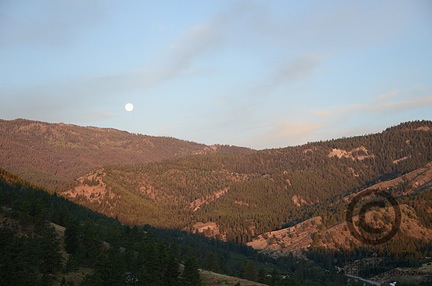Fire season is serious business in the west.
Every fire season seems to get a little worse in the west — particularly in the Pacific Northwest where I now live. For the past four summers, we’ve had widespread wildfires, most of which were started by lightning strikes. Fires have been particularly threatening, if not downright damaging, near my new home:
- In September 2012, lightning strikes started over 100 wildfires from Blewett Pass to Lake Chelan. Visibility dropped down to less than 1/2 mile in smoke and mandatory evacuations affected the Wenatchee Heights area that was my temporary home not long after I left for Arizona.

I was at a party at the airport on the evening of August 10 while Jumpoff Ridge was burning.In August 2013, lightning strikes started a handful of fires on Jumpoff Ridge, the cliffs that tower behind my current home. Although I’d just purchased the land and didn’t have anything on it, I was as alarmed as my neighbors when my road was put on mandatory evacuation, mostly because firefighters feared that burning debris would tumble down the cliffs and start new fires on our level. (Fortunately, that didn’t happen.)
- In July 2014, more than 300 homes were destroyed when a fire hit the community of Pateros, about 45 miles upriver from Wenatchee. Other fires up the Methow River near there destroyed forests, orchards, and a few more homes.

I shot this photo of the Sleepy Hollow Fire on the night of June 28, 2015 from my deck using a 300 mm lens. It isn’t cropped. Although the fire was more than 8 miles from my home, I found it terrifying and could not sleep that night. A pair of heavy rainstorms the next day put the fire out — and started the Wolverine Fire up near Lake Chelan that’s still burning today.In June 2015, the Sleepy Hollow fire destroyed more than 20 homes in a Wenatchee subdivision overlooking the town. Burning embers from the fire traveled on the wind and touched off fires a half mile away, destroying 3 warehouses and fruit packing and storage facilities.
As I write this, there are dozens of fires all over Washington, Idaho, and Oregon. These fires are growing at alarming rates. The Okanogan Complex Fire, for example, started on Saturday, August 15 — that’s just 8 days ago — and has already grown to 227,206 acres. That’s 355 square miles — larger than the entire city of New York (all five boroughs).
Can you imagine all of New York City burning in a week?
And that’s just one of the monster fires. Chelan Complex has burned 87,412 acres in the Chelan area, North Star has burned 132,000 acres on the Colville Indian Reservation, and Grizzly Bear Complex has burned 59,150 acres in the Umatilla National Forest. The Interagency Inciweb website is currently tracking 26 fires in Washington State alone. The President has declared Washington a disaster area. This is some serious shit.
Although the closest fire is at least 20 miles from here, a wind shift has brought smoke into the valley. Visibility is less than 3 miles — I can’t even see the airport from my home. The smell of smoke is in the air. I spent much of yesterday outdoors doing light work and wound up with a sore throat from breathing smoke.
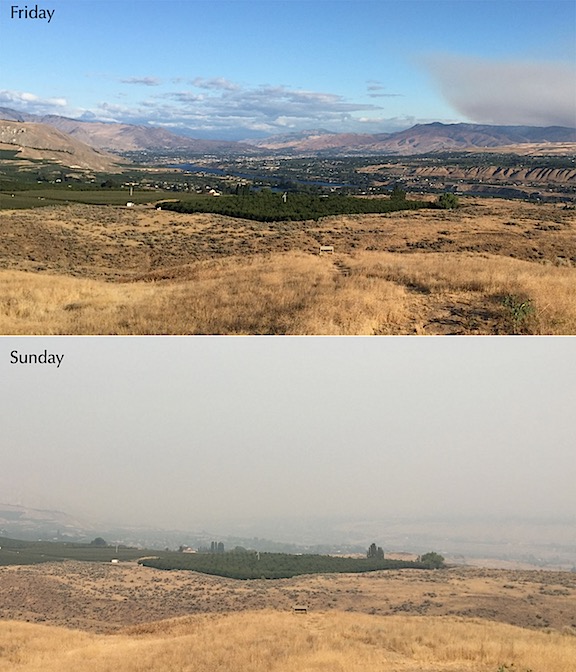
On Friday, the air was very clear, although I could see the smoke cloud coming our way. This morning, the air is thick with smoke. I can barely see the buildings at the airport just 3 miles away.
The scariest part of fire season for those of us who live on the outskirts of town, surrounded by natural vegetation, is the fact that it doesn’t take much to start one of these crazy fires. Lightning is the most common cause, but fires have also been started by cigarette ash, sparks from chainsaws or mowers or ATVs, and even cars with hot engines parking on tall, dry grass. If Mother Nature doesn’t start a fire, some careless idiot might.
As you might imagine, the idea of “defensible space” is on many people’s minds. In theory, it means keeping enough clear area around your home so that firefighters can defend it from wildfire. That usually means cutting down trees and bushes and trimming long grass, surrounding your home with heavily irrigated vegetation such as green lawns or orchard trees, and removing any firewood or scrap wood piles near your home. If your home does not have defensible space, not only is it more likely to burn in a wildfire, but firefighters may not even try to defend it because of the danger it could put them in.
I did much of this over a month ago when I used my string mower to cut back the tall, dry grass on the side and back of my home. I debated cutting a few of the small sagebrush in the area — they burn hot and fast when ignited — but left them. The other two sides of my house have concrete and gravel and a small lawn.
Of course, some of us take it the next step by installing sprinkler systems that can be turned on, when needed, to soak the area. I did that the other day. I drove two 6-foot T-posts into the ground, one at each corner on the road side of my home. Then I fixed 50-foot sprinkler heads to the top of each one. I ran hose from my shed — which has extremely high water pressure — to the first sprinkler and another hose from that one to the second one. When I turned them on, they provided coverage along the entire road-side of the building, as well as about 50 feet down the front and back.
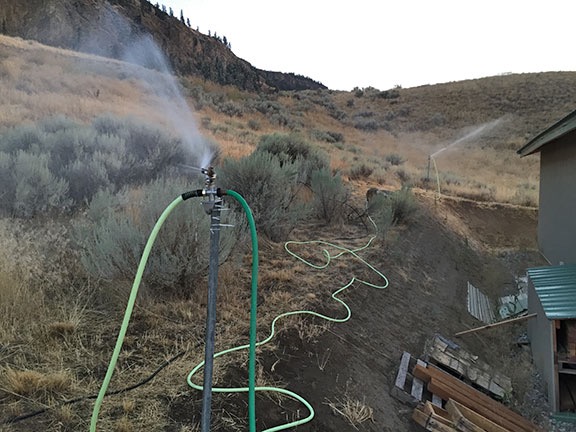
Here’s my sprinkler setup on the road side of my home. I do need to move some of the scrap wood there, or cover it with some of the metal panels I have.
I want to add a third sprinkler to the roof of my shed, which would protect the shed and chicken coop. A fourth sprinkler head can be mounted on my deck in the other back corner of the building to provide some protection there.
My friends have been asking me whether I have a generator for the water pump. They assume I have a well. I don’t. I have city water which should keep flowing as long as the water company keeps it coming. I guess I should hope that they have generators.
Yes, I know it isn’t perfect, but it’s better than nothing.
The good thing is, my building is made of metal. So flying embers landing on the roof or against a wall should not be able to start a fire. There are some exposed wood beams, however, and I’m not fooling myself into thinking the building is fireproof. As too many folks around here have learned over the past few years, even metal buildings can burn if they’re subjected to enough heat. My goal is to prevent that heat from getting close enough.
I’m not the only one thinking about fire. Kirk has moved his vehicles into his orchard, which is far less likely to catch fire if fires come through the canyon where he lives.
Anyone who lives in an area prone to wildfire damage who doesn’t create defensible space around their home is an idiot, plain and simple. As we’ve seen this year, even homes in subdivisions that are normally safe from wildfire danger can be completely and utterly destroyed. Why would anyone fail to take steps to protect their home before such protection was absolutely necessary?
When the fires come, you often don’t have time to act before evacuation. I feel a bit of comfort knowing that I can get my sprinklers going in a matter of minutes now because they’re already in place. This might mean the difference between keeping my home standing and losing everything I own.

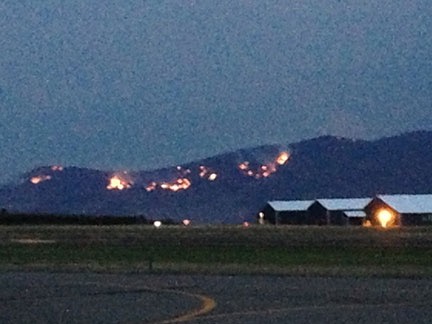
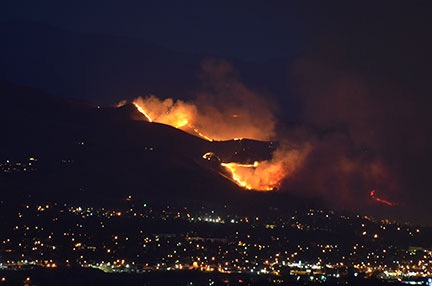
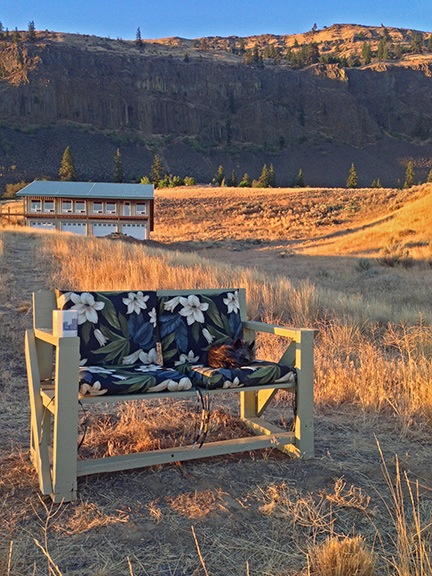
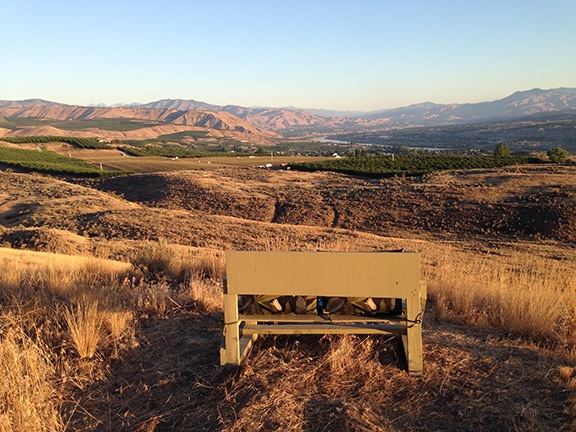
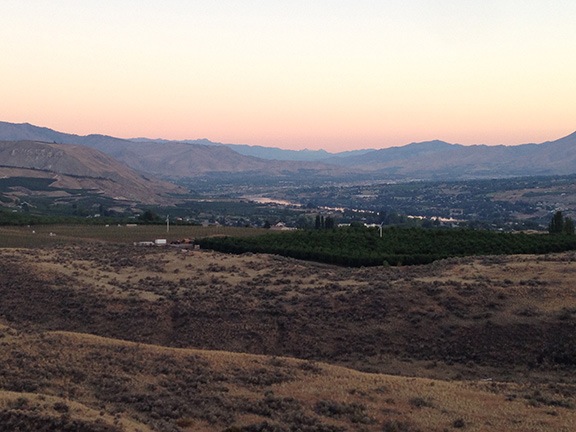
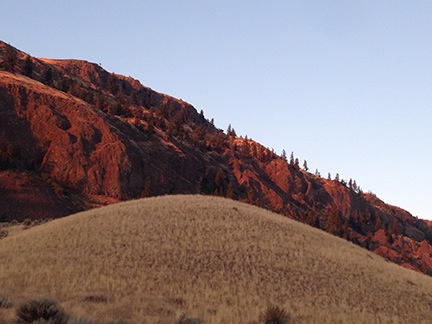
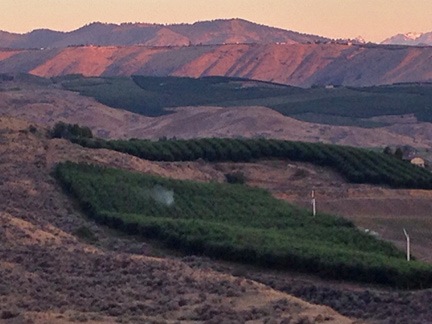

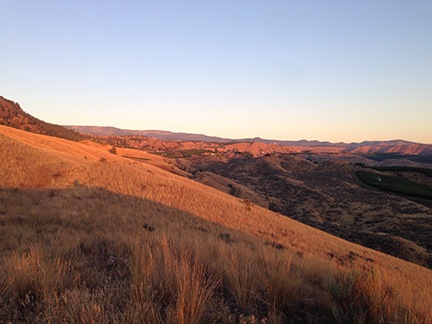
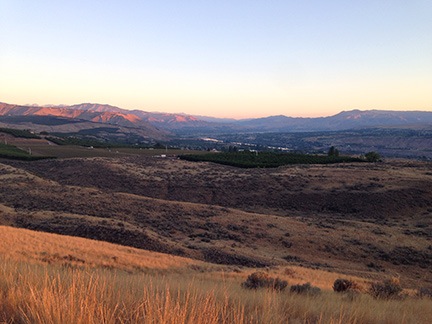
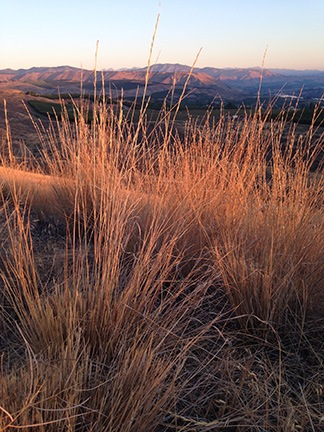

 Today, however, I started work on the book I’ve been thinking about for the past month or so. Tentatively titled Flying the Canyon: My Season as a Grand Canyon Helicopter Tour Pilot, this book will share my experiences from one of the most interesting summers of my life.
Today, however, I started work on the book I’ve been thinking about for the past month or so. Tentatively titled Flying the Canyon: My Season as a Grand Canyon Helicopter Tour Pilot, this book will share my experiences from one of the most interesting summers of my life. Today, I churned out over 4,000 words, completing the introduction (which I just shared here), a Prologue, and Chapter 1, which briefly covers my experiences learning to fly and getting my commercial pilot rating. My goal is to have the entire book finished by month-end — a goal I know I can reach if I can stay focused on my work. (With little else do do this winter, it shouldn’t be much of a problem to find time!)
Today, I churned out over 4,000 words, completing the introduction (which I just shared here), a Prologue, and Chapter 1, which briefly covers my experiences learning to fly and getting my commercial pilot rating. My goal is to have the entire book finished by month-end — a goal I know I can reach if I can stay focused on my work. (With little else do do this winter, it shouldn’t be much of a problem to find time!) Finishing up a special iBooks 2 interactive edition of
Finishing up a special iBooks 2 interactive edition of  Prepare scripts for a revision of my
Prepare scripts for a revision of my 